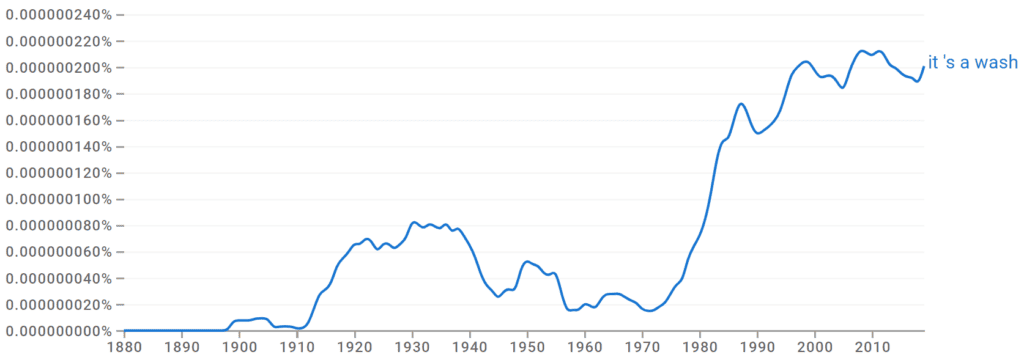“It’s a wash” describes an outcome in which everything involved is void or that all has come out even; nothing is gained or lost. For example, if you won $100 on a horse race and bet the money on another horse that lost, you would call it a wash.
The expression is considered idiomatic slang or figurative speech that describes something in an informal manner. Idioms often derive from literal uses of the word or words they are made up of, but they are used to help make connections through forms of speech such as analogy. Learning how to use idioms properly can elevate your English language skills.
Keep reading to learn more about this idiom’s meaning, usage, and how to apply it to your own material.
What Does ‘It’s a Wash’ Mean?
“It’s a wash” describes something that comes out even; no one side has an advantage over another, or the positive and negative aspects of a situation seem to cancel each other out.
For instance, one may go to a casino and win twenty dollars playing roulette and then lose twenty dollars playing slot machines. In this case, the gambler has neither lost nor won money in the long run; his experience may be said to have been a wash.
You can use the expression in multiple ways as well. Related terms include was a wash, is a wash, and in a wash.
Using ‘It’s a Wash’ in Sentence Examples
- When it comes to weighing the risks of certain medications with their side effects, for most people, it’s a wash.
- For early retirees, investing savings to buy years toward retirement ends up in a wash since they lose the money that would have been a part of their package.
- Buying stocks at the same price I sold them at was a complete wash; my advisor should have paid closer attention.
It’s a Wash Origins
The expression “it’s a wash” came into use in the early 1900s to mean something disappointing, evoking the image of something washed away. By the mid-twentieth century, the term took on its current meaning of a situation in which there is no net loss or gain.
The exact origins of the term are unknown, but it likely derived from the term wash-out, a 16th-century phrase that means to literally obliterate or erase something written in ink. If parchment was mismarked or needed to be reused, you could wash it out or clean it to be used again.
The figurative use of the expression gives a general feeling that something that existed or expected failed to materialize.
Let’s Review
If you use the expression “it’s a wash,” you are explaining that whatever scenario was expected didn’t materialize due to the aspects of the situation canceling each other out.
This is often applied to gambling or taking a chance since it relates to a person putting forth money or trust in something that never pays out due to the risk factor ending up equalized; therefore, the person is no further ahead than when they started.


